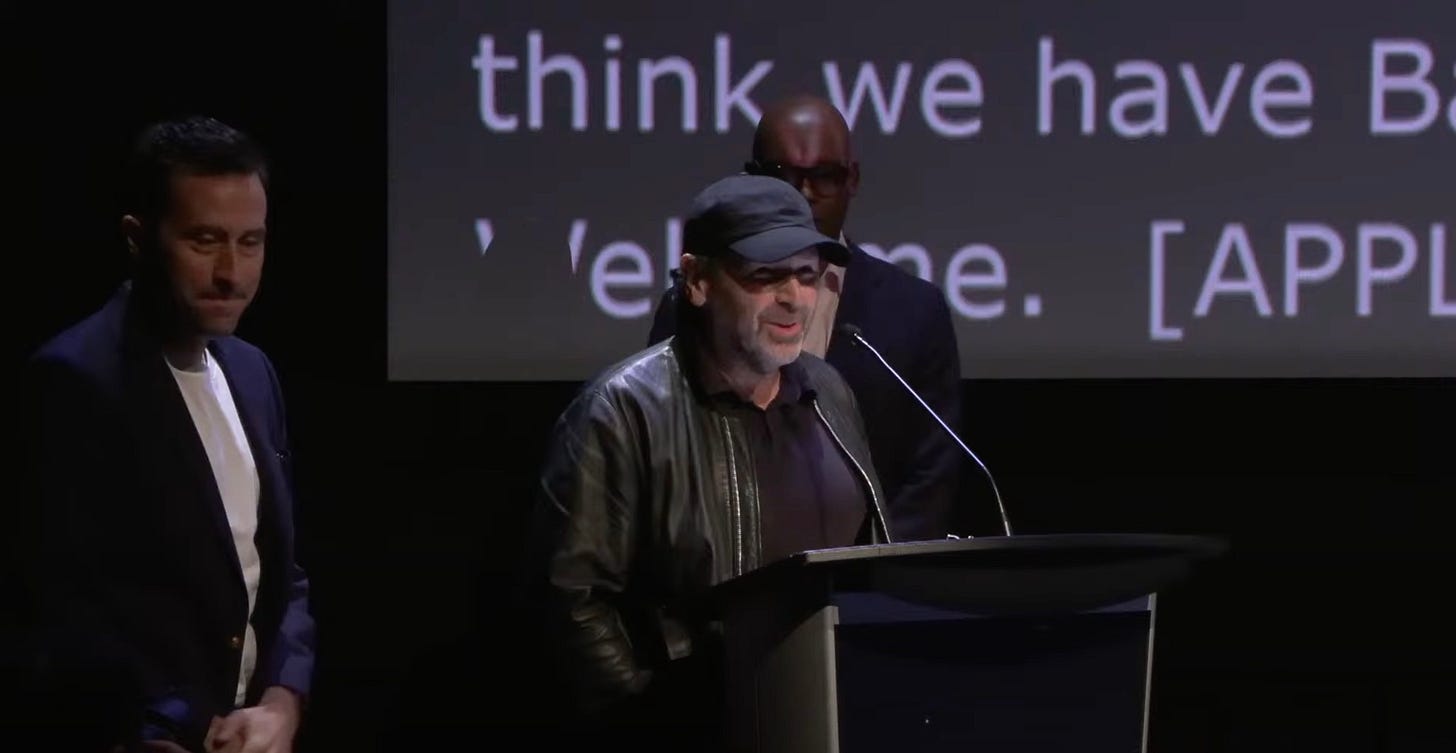TIFF '25 Wrap-Up
A few words about permanent stains
I might have liked to once against skip the final day of the festival, in truth. To have that one day before the start of the new workweek to simply rest up. But one film called me: Mark Jenkin’s Rose of Nevada, which I was unable to slot in any other day, but was determined to see. I went down to the Scotiabank rush line way too early for it, just to make sure I’d be first in line, and also because I didn’t mind chilling outside, reading. If I wasn’t going to have rest, at least I could get a chapter or two further into Middlemarch, which I did! I also got to chat with friends while in line, which was really fun, and finally, at the very last minute—the film had already just started, in fact—I got in to Rose of Nevada.
It was great. Despite what appeared on the surface to be something more mainstream than his usual fare, thanks to having stars like George MacKay and Callum Turner, Jenkin has not lost an ounce of the enigmatic style that pervaded his previous films, Bait and Enys Man. The film has a clearer narrative to hold onto, involving time travelling fishing boats and dislocated personalities, but as you can imaging, those are narratives that allow for plenty of elliptical, avant-garde style, and Jenkin pushes that style far. His penchant for lush, rough looking 16mm photography is here in spades, as is his incredible control of mood, which carries the film beautifully, even when whatever’s going on is a total mystery. He also carefully builds an emotional landscape across the film, ending at a place that is both clever and moving, even though if you asked me to explain what had happened, I would likely come up short. It was an excellent close to a TIFF 2025, a year I have very mixed feelings about.

I thought about following last year’s example, and using this wrap-up to talk about my general of experience of the festival—overall good, with some great films amid an uninspiring lineup, and some even better times with friends—and give stats on my viewing—31 screenings total!—but that seemed unimportant in the face of yesterday deplorable events at the 2025 TIFF Awards Ceremony. Some good came out of that ceremony, including my friend Sophy winning the Best Canadian Discovery Award for her magnificent Blue Heron, and films like Nirvanna the Band the Show the Movie and Hamnet, both of which I loved, winning prizes as well. In the middle of it all, though, Barry Avrich’s film, The Road Between Us: The Ultimate Rescue, took the People’s Choice Documentary Award.
I have not seen The Road Between Us—alternately known around town as “the Barry Avrich thing” or “the October 7 movie”—so I genuinely cannot comment on its merits as a film or its actual content. I do know that its story, about a former Israeli general driving down into the heart of the violence during that day’s massacre in order to save his family, raised eyebrows from me the moment I understood it was about Noam Tibon. Critical of Benjamin Netanyahu and some of his conduct running the current assault on Gaza, Tibon is nonetheless a man who, in the early 2000s, served as a commander in occupied Hebron, where soldiers regularly committed crimes against Palestinians under his watch. Perhaps evolved since then—having been literally assigned to investigate criminal treatment of Palestinians by Israeli soldiers by a commission in 2014—Tibon’s public statements on the current war have mostly avoided acknowledging the humanity of Palestinians, if he even acknowledges Palestinians at all. His singular focus on Netanyahu, the fate of the Israeli hostages taken on October 7, and the way the war has torn Israeli society apart is at best a perfect example of the solipsism of Israeli liberals, whose appeals to peace are entirely self-serving, with little actual humanity at their core. Would that the Palestinians could disappear in a puff of smoke, then at least none of this would be a problem, they imagine.
But again, I have not seen the film, which for all I know might be perfectly inoffensive (to a reasonable person) as a document about a family going through a mass atrocity. I would like to make something clear: I do not have any theoretical problem with this film, or most any film really, being screened at TIFF. What I have a problem with is how its screening and eventual award win came about, and what it says about the disgusting lack of values on display from both TIFF and CEO Cameron Bailey specifically.
An important thing to stipulate here is that The Road Between Us was never actually officially announced for TIFF originally. It was not included in the festival’s initial TIFF Docs lineup. That’s because it was never actually selected by the programming team. In fact, though Avrich submitted the film for consideration, the programmers declined to include it. No reason has been given for that rejection, but literally thousands of films are rejected by TIFF each year, and the idea of a local, not particularly respected filmmaker having his film miss out on the fest is hardly unusual. But, by Bailey’s own admission, Avrich, a former TIFF board member, went around the programming team, directly to the CEO, to appeal for reconsideration.
“In the context of over 9,000 submissions this year, it just didn’t make the cut,” Bailey told The Globe and Mail last week. “I then heard that Barry wanted another look at it from us, and we arranged another screening. I think there’s real merit in the story being seen, and I made the decision to include the film in the festival.”
One might reasonably ask Bailey, how many filmmakers who are not former board members of TIFF would have been able to get such reconsideration? And furthermore, why was it that with a subject so politically charged, Bailey took it upon himself to supersede the decisions of his own programming staff? (I know for a fact that multiple programmers were angry to have been put in this position, made to look like antisemites for denying the movie a slot.)
So Bailey went over their heads and invited the film to screen at TIFF. But once again, it was not officially announced. Instead, the team behind the doc “leaked” a trailer for the film, with indications that it was playing TIFF. The ground was seeded for the con to come. Weeks later, Avrich went public, claiming that TIFF had disinvited his film, implying that it was due to the film’s controversial subject. This was the Toronto International Film Festival censoring Jews on the subject of the October 7 massacre, and the backlash was huge. TIFF pushed back on the claims, explaining that there had simply been issues surrounding security arrangements and rights clearances that still needed to be addressed, which led to even more backlash from people who falsely understood that to mean the filmmakers needed to license footage from Hamas.
Anybody who knows TIFF well, including some of its inner workings, knows this was never the truth. TIFF may care theoretically about rights clearances, but plenty of films play with dodgy rights claims. The important thing is that, legally, the filmmakers can vouch for their material, filling out paperwork to take ownership over any potential issues around that. By Bailey’s vague explanation, Avrich and his team failed to provide the proper assurances. People I spoke to in the know told me he had refused to submit key paperwork that pretty much every other filmmaker at the fest must fill out in order to be screened. This is where things start stinking to high heaven. Here was a filmmaker, who went outside the normal channels, using his nepotistic connections to get his film accepted in the first place, refusing to cooperate on basic legal, bureaucratic filings to get his film shown. Rather than simply working properly with TIFF, he drummed up a public campaign against the festival, giving his film an unearned spotlight and generating mass controversy in all directions. Carnival barker, con man shit.
Prominent donors revolted against TIFF, and I heard from some that the Government of Ontario threatened to pull its support for the festival if the film wasn’t screened. I even heard rumours of a meeting in which Bailey was sat in a room with some of Toronto’s wealthy elite to force him into screening the film, though no confirmation there. So Bailey had invited a film against the objections of his staff, only to have the makers of that film create a situation where the festival was existentially threatened and painted as an antisemitic institution. I did not attend the screening of the film, but a video shared by critic Radheyan Simonpillai during the moderated discussion after the film gave an indication of just how vile an audience the film and its surrounding controversy attracted:
When moderator Lisa LaFlamme dared to bring up the over 64,000 dead Palestinians in Gaza, the crowd booed her. This is what TIFF had allowed its space for artistic expression and shared humanity to become.
Along with the screening itself, supporters of the film and Israel took to social media to drive thousands of votes for the film for the festival’s People’s Choice awards, brazenly astroturfing a victory that any reasonable organization would have stepped in to stop. Instead, on the last day of TIFF, Cameron Bailey got onstage to hand Barry Avrich an award.
"Besides Cameron, who is fantastic, I want to thank the incredible staff at TIFF,” said producer Mark Selby, accepting the prize. “I hope all the filmmakers of this festival feel as supported as Barry and I did through this whole process." The irony of this statement, after all that had gone on, is sickening. A spit in the face at Bailey, other filmmakers at the festival (and those rejected, too), and TIFFgoers alike. A total farce, in which claims of victimhood and accusations of antisemitism were used to help whitewash an organized project in support of genocide and ethnic cleansing. That Bailey would simply stand there and take it is shameful.
“I regret that, and it’s something that I know caused a lot of pain and hurt in the Jewish community in particular, and I apologize for that,” Bailey told The Globe and Mail, when asked about the film’s supposed disinvitation. I don’t know which Jewish community Bailey is talking about—except perhaps those I know who were lied to in the media by the craven filmmakers behind this documentary—but I am Jewish, and I would like an apology for having to attend a festival run by spineless people who roll over for such crass, inhuman displays ostensibly in my name. Never have I felt so personally disrespected by TIFF, as both a Jew and a human being. The inability or unwillingness to stand up to Zionist bullying, at a time when the government of Israel is conducting a genocide against Palestinians, is unconscionable. It put me, personally, in the position of having to calm down friends and family who worried I was attending an antisemitic, censorious festival. It made me have to walk by as people waving flags of the country my parents were born in sickeningly protested outside Roy Thomson Hall, advocating the continued slaughter of Palesintians.
To allow this film, given all that, to go home with an astroturfed People’s Choice prize is the lowest moment in the festival’s history, as far as I can tell. It’s a stain that will not easily be washed away.




Corey, thank you for shedding light on this fiasco.